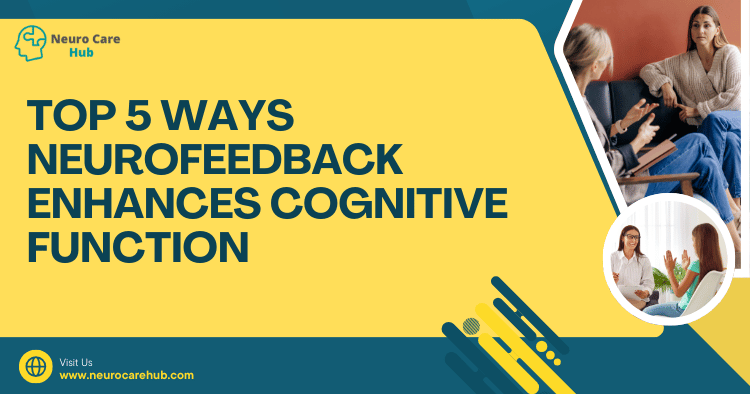Table of Contents
- What is Neurofeedback?
- 1. Optimizes Brainwave Patterns
- 2. Improves Focus and Attention
- 3. Enhances Memory Retention
- 4. Reduces Anxiety and Stress
- 5. Promotes Better Sleep Quality
- Conclusion
- FAQs
What is Neurofeedback?
Neurofeedback, also known as EEG biofeedback, is a type of biofeedback that uses real-time displays of brain activity to teach self-regulation of brain function. This innovative technique monitors brainwave patterns and provides feedback, allowing individuals to train their brains to operate more efficiently. The result? Enhanced cognitive function, improved emotional well-being, and a better quality of life.
Neurofeedback is increasingly being recognized for its transformative potential. According to a review published in the journal Frontiers in Human Neuroscience, neurofeedback can lead to significant improvements in cognitive performance and mental health. Read more here.
1. Optimizes Brainwave Patterns
The human brain operates through various frequencies of brainwaves, each associated with different states of mind. Neurofeedback helps individuals learn to shift their brainwave patterns toward optimal states for cognitive performance.
How It Works
Neurofeedback sessions involve placing electrodes on the scalp to monitor brain activity. The feedback, often in the form of sound or visual cues, helps individuals understand when they are achieving desired brainwave states. For instance, an increase in beta waves (associated with active thinking and focus) can indicate a state of heightened alertness.
| Brainwave Type | Frequency Range | Associated State |
|---|---|---|
| Delta | 0.5 – 4 Hz | Deep sleep |
| Theta | 4 – 8 Hz | Light sleep, creativity |
| Alpha | 8 – 12 Hz | Relaxed, calm |
| Beta | 12 – 30 Hz | Active thinking |
Benefits
By training the brain to optimize its wave patterns, individuals can experience improved concentration, creativity, and decision-making skills. This optimization can be particularly beneficial for students, professionals, and anyone looking to enhance their cognitive capabilities.
For more insights on how neuro care can support brain health, check out Top 5 Lifestyle Changes for Better Neuro Health.
2. Improves Focus and Attention
Struggling with focus and attention is a common challenge in today’s fast-paced world. Neurofeedback can be an effective tool in improving these critical cognitive skills.
How It Works
During neurofeedback training, individuals learn to increase their beta wave activity while decreasing theta waves. This shift promotes a state of heightened focus and mental clarity. Studies have shown that individuals who undergo neurofeedback training demonstrate significant improvements in their ability to concentrate on tasks.
Benefits
The impact of enhanced focus and attention extends to various areas of life, including academic performance, workplace productivity, and overall task completion. Improved attention control can also lead to better time management and organizational skills.
For additional strategies to enhance neuro care effectiveness, see Top 5 Ways Caregivers Enhance Neuro Care Effectiveness.
3. Enhances Memory Retention
Memory is a core aspect of cognitive function, and neurofeedback can play a vital role in enhancing both short-term and long-term memory retention.
How It Works
Neurofeedback training can help strengthen neural pathways associated with memory. By promoting optimal brainwave patterns, individuals can improve their ability to encode, store, and retrieve information. Research has indicated that neurofeedback can lead to notable improvements in memory performance, particularly in older adults and those with cognitive impairments.
Benefits
Whether you’re a student trying to memorize information for exams or an adult pursuing continuous learning, improved memory retention can lead to greater success in both personal and professional endeavors.
For more on the benefits of regular neuro check-ups, visit Top 5 Benefits of Regular Neuro Check-Ups for Your Health.
4. Reduces Anxiety and Stress
High levels of anxiety and stress can hinder cognitive function, making it difficult to think clearly. Neurofeedback offers a way to manage these emotional states effectively.
How It Works
Neurofeedback training can help individuals learn to regulate their emotional responses by promoting relaxation and reducing excessive theta wave activity. By fostering a calm brain state, individuals can experience reduced anxiety and stress levels.
Benefits
Lower anxiety and stress levels lead to improved cognitive function, allowing individuals to think more clearly, make better decisions, and engage more fully in their daily activities. This improvement can be particularly beneficial for individuals with anxiety disorders or those facing high-stress situations.
For insights on integrating neuro care into wellness routines, check out Top 5 Ways to Integrate Neuro Care into Wellness Routine.
5. Promotes Better Sleep Quality
Sleep is crucial for cognitive function, and neurofeedback can positively impact sleep patterns and quality.
How It Works
Neurofeedback can help individuals learn to achieve the brainwave patterns associated with deep, restorative sleep. By training the brain to transition smoothly through different sleep stages, individuals can improve both the quantity and quality of their sleep.
Benefits
Better sleep not only enhances cognitive function but also contributes to emotional stability and overall well-being. With improved sleep quality, individuals may find it easier to concentrate, remember information, and manage stress effectively.
For more on sleep’s role in brain health, refer to Top 5 Ways Sleep Impacts Your Brain Health Function.
Conclusion
Neurofeedback offers a powerful and innovative approach to enhancing cognitive function. By optimizing brainwave patterns, improving focus and attention, enhancing memory retention, reducing anxiety and stress, and promoting better sleep, neurofeedback can significantly improve your overall cognitive abilities. Whether you’re a student, a professional, or someone seeking personal growth, neurofeedback may be the key to unlocking your brain’s full potential.
FAQs
Is Neurofeedback safe?
Yes, neurofeedback is generally considered safe and non-invasive. It has been used in clinical settings for years. However, it’s always best to consult with a healthcare provider before starting any new treatment.
How long does a neurofeedback session last?
Typically, a neurofeedback session lasts about 30 to 60 minutes, depending on the individual and the specific protocol being used.
How many sessions are needed to see results?
The number of sessions required can vary significantly from person to person. Many individuals start to notice changes after 10 to 20 sessions, but some may need more.
Can neurofeedback help with ADHD?
Yes, neurofeedback has shown promise in helping individuals with ADHD by improving attention and reducing impulsiveness.
Where can I find a neurofeedback provider?
You can search for certified neurofeedback providers through organizations like the Biofeedback Certification International Alliance.
By embracing neurofeedback, you’re taking a proactive step toward cognitive enhancement and overall well-being. Remember, every brain is unique, and with the right support, you can unleash your cognitive potential! For more essential insights on neuro care, check out Top 5 Essential Insights on Neuro Care You Need to Know.






